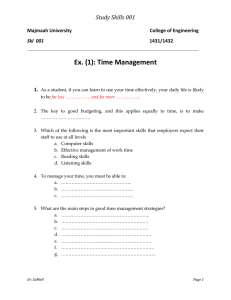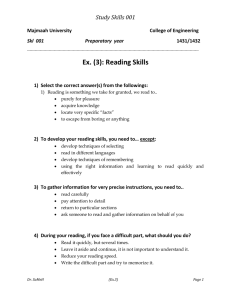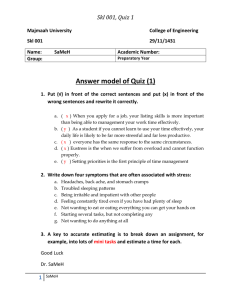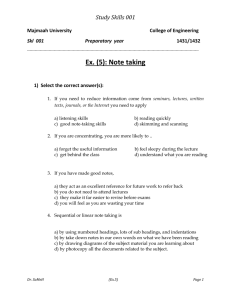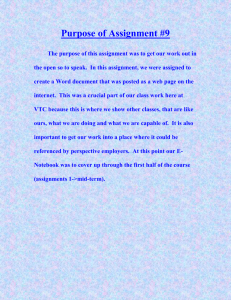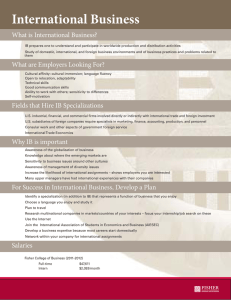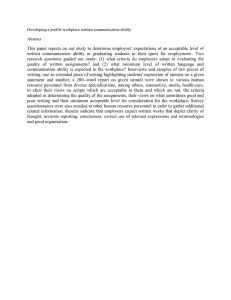1-time-management
advertisement
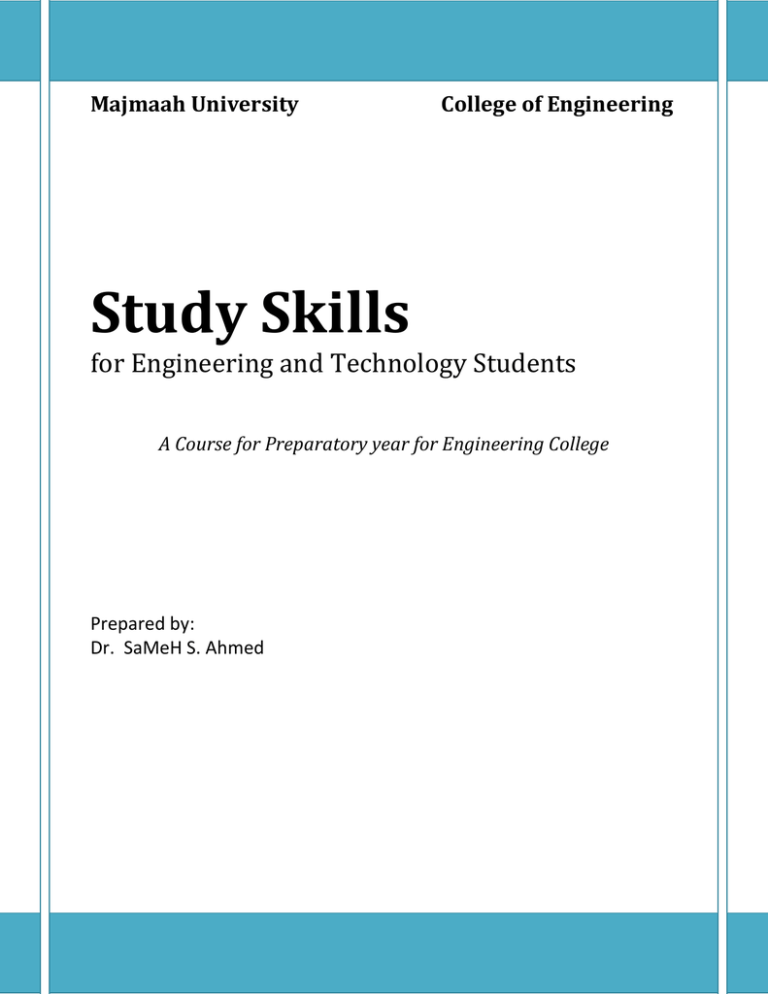
Majmaah University College of Engineering Study Skills for Engineering and Technology Students A Course for Preparatory year for Engineering College Prepared by: Dr. SaMeH S. Ahmed Study Skills [STUDY SKILLS] 1.Time Management Skills Introduction Time is a precious commodity when you are a student. It can be very challenging to manage time. New demands such as organizing your study time, your budget, your meals, and your social life come rushing in. If you are a mature student, you may have family and other responsibilities to fit around your new, academic life. Whenever and wherever you are studying, you may have to work part-time to help support yourself during your studies. There is no student loan scheme for time and no entrepreneurial inspiration will create more of it, but you can manage what you have really well. Time management at work Time management is a really valuable skill to develop before you start going for job interviews and become involved in work. Effective management of work time is one of the most important skills that employers expect their staff to use at all levels. Training courses in time management are very common in industry and commerce; this demonstrates just how highly employers rate it. As a student if you can learn to use your time effectively, your daily life is likely to be far less stressful and far more productive. Setting priorities Being able to prioritise is absolutely central to good time management, and is usually mentioned as its first principle. You must be able to work out what is important, how long it will take you, and when it needs to be completed to have a hope of managing your time effectively. List the things you know you must do. Look at the deadlines to see which really has to be done first. Look at the ease with which different tasks can be accomplished. Work out what you need to accomplish particular tasks, e.g., a particular book, a quick word with a tutor, and a discussion with other people in a project group. Be realistic; do not set yourself a timetable that means you are bound to fail by the end of day one. SaMeH Page 2 Study Skills [STUDY SKILLS] Budget your time If you are a keen student of politics or economics, perhaps the Chancellor’s annual budget with its forecasts and estimates is a great thrill; on the other hand, perhaps not. The key to good budgeting, and this applies equally to time, is to make realistic estimates. Do you really have a clear idea about how long particular activities take you? It is very common to underestimate the time required, and if this happens more and more, you get further and further behind. A key to accurate estimating is to break down an assignment, for example, into lots of mini tasks and estimate a time for each one. Time wasters A great timesaver is to start having tidy work areas, no piles of papers on your desk, floor, or windowsill. Even if you keep most things electronically, it is just as important to organise your files properly, so that you can easily access information and remember where you put it. Keeping back-up copies is important, just in case you have a really bad crash on your computer. It is more pleasant to work in a tidy work environment and it also means you save time because you do not have to keep looking for things you have lost. Organisation It is easy to laugh at people who make endless lists of things they have to do (spending a large part of their valuable time making lists), but being able to organise and especially to prioritise your time is really important. If you tick things off the list as you achieve them, you start to get some feedback that suggests you are being successful and this is a great boost. At the end of this chapter (should chapter references be included as they aren’t used to organise content in the CWS? Consider rewording), there is a printoff sheet you can take away that helps you to look at how you use time, and you may find this quite revealing. A sense of direction One key principle of good time management is to ensure that the effort you put in is directed to getting useful outcomes. Traps associated with this include being tempted to work on something interesting, even if it is less urgent, rather than spending time on something more boring or more difficult. Another common trap is feeling that your work has to be absolutely perfect, so that whether it is an essay or a project, you end up going over it too many times, just to make the most minor alterations. Try to apportion time fairly between your different assignments. SaMeH Page 3 Study Skills [STUDY SKILLS] Your body clock Whether you are a lark or an owl, it is no good telling your nine o’clock lecturer that you are an owl and that is why you are late. What you can do is work with your body rather than against it. If you know you are an evening or a morning person, and this is when you produce your best work, plan your day so that you can do important assignments that demand your best attention at that time of the day. Take note of other peaks and troughs in your own body clock, so that you can make the best of your high spots. Time management strategies Imagine, and this may be all too close to the truth, that in two weeks’ time you have five assignments to complete. Between now and then you have two important social engagements and next week you have two interviews for part-time work. After a brief moment of panic, do the following: Clarify your objectives. Make an action list each day. Set a major target each day. Achieve that target. Be productive in the first hour. Set time limits for each activity. Make time to get things right the first time. Time to sum up There is good news: it is easy to improve your time management skills. By putting into practice the suggestions in this chapter, you will find that you do have more control over your time. Of all the study skills you acquire, the knock-on effects of mastering this one are enormous. Above all, you will feel better. You are less likely to hand assignments in late or be the last one in the library, trying to get hold of a key text. Your planning skills will feed into your revision strategy and they will undoubtedly impress future employers and ensure that you enjoy your work more because you feel in control. SaMeH Page 4
